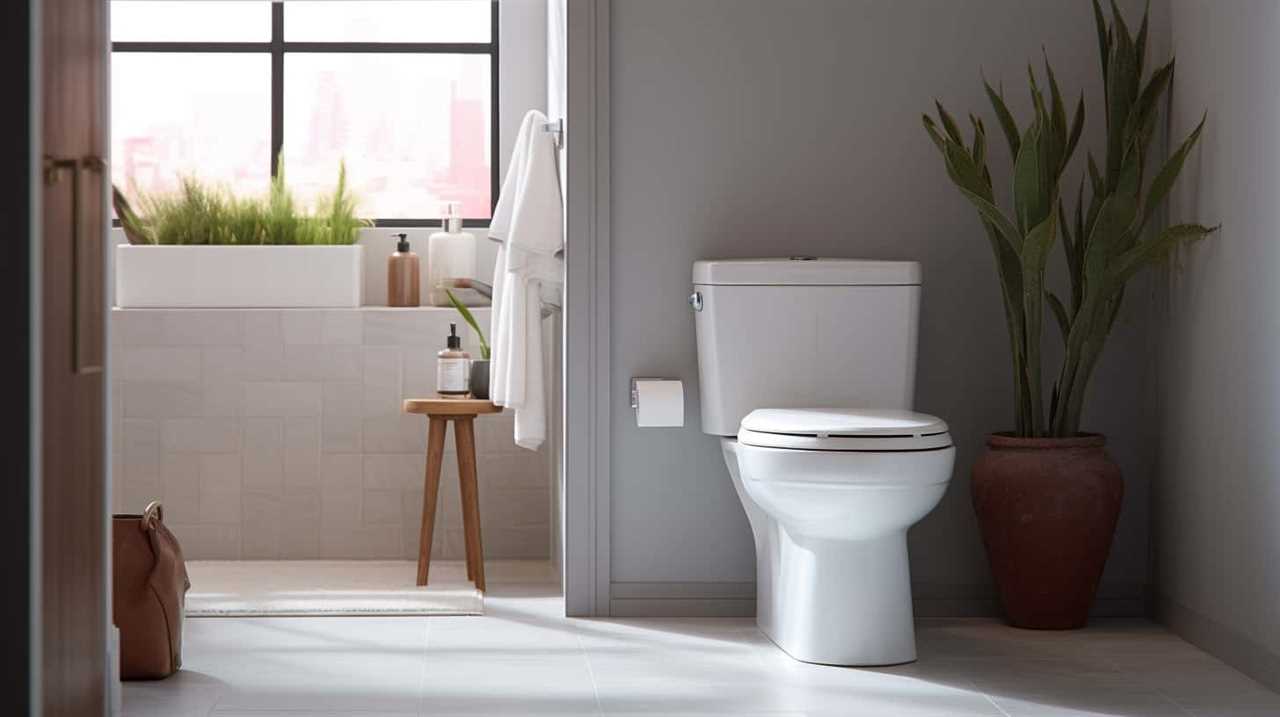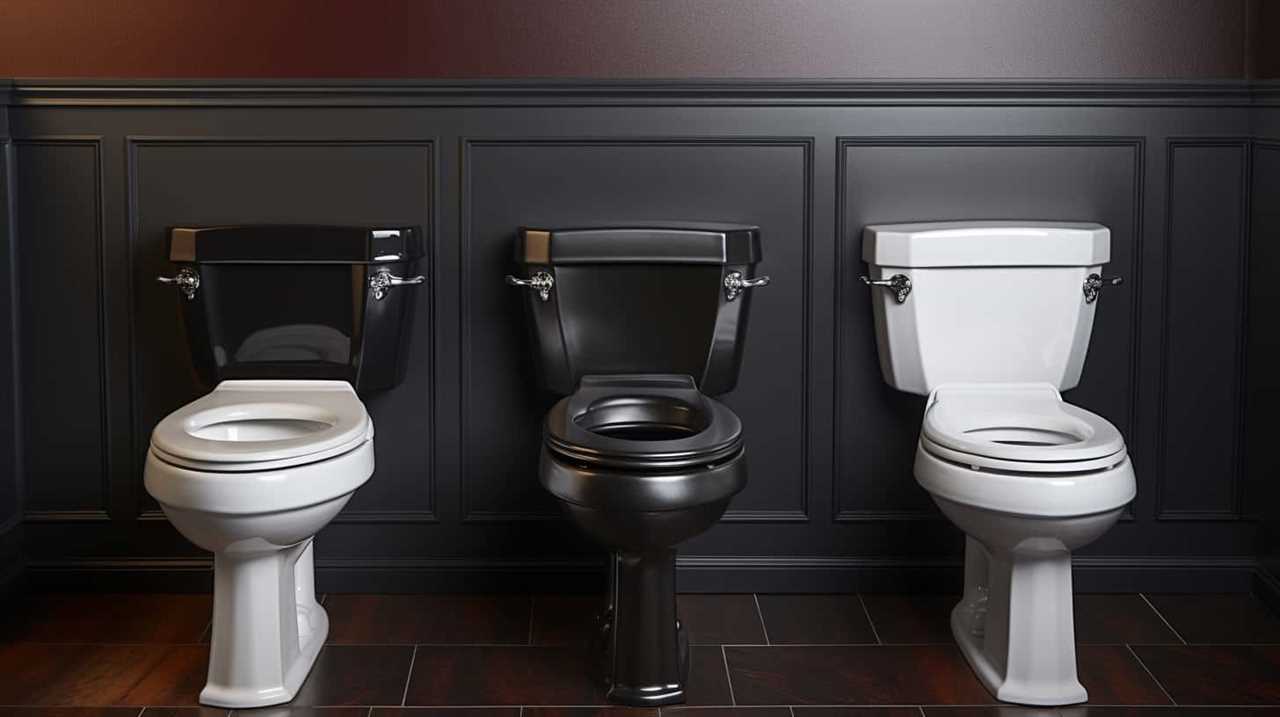We’ve all been there – dealing with a stubborn clog in the toilet that just won’t budge. But before reaching for any drain cleaner, it’s crucial to know which ones are safe for the toilet.
In this article, we’ll explore the different types of drain cleaners and highlight the ones that won’t cause any damage. We’ll also discuss natural and environmentally-friendly options, as well as precautions to take when using these cleaners.
Get ready to master the art of safe toilet cleaning!
Key Takeaways
- Baking soda and vinegar are effective and environmentally friendly options for minor blockages.
- Choose a drain cleaner specifically formulated for toilets to prevent damage to pipes and fixtures.
- DIY toilet cleaners like baking soda and vinegar or lemon juice and salt mixture are safe and cost-effective.
- Take necessary safety precautions when using drain cleaners, such as wearing protective gear and ensuring proper ventilation.
Understanding the Types of Drain Cleaners
To better understand the types of drain cleaners that are safe for the toilet, let’s start by exploring the effectiveness of using a combination of baking soda and vinegar. This natural remedy has been widely recommended for its ability to break down clogs and remove buildup in drains.

One of the pros of using baking soda and vinegar is that they’re readily available and inexpensive compared to commercial drain cleaners. Additionally, they’re environmentally friendly and don’t contain harsh chemicals that may damage your plumbing system.
However, it’s important to note that while this method can effectively unclog minor blockages, it may not be as effective for stubborn or severe clogs. Therefore, for more challenging toilet clogs, it may be necessary to consider alternative drain cleaning methods.
Safe Drain Cleaners for Toilet Clogs
For our toilet clogs, we’ve found that using a drain cleaner with safe ingredients is essential. When it comes to preventing toilet clogs, it’s important to choose a drain cleaner that’s specifically formulated for toilets. Here are three key factors to consider when selecting a safe drain cleaner:
- Non-corrosive formula: Look for a drain cleaner that’s non-corrosive to prevent any damage to your toilet pipes and fixtures. This will ensure that the cleaner effectively dissolves the clog without causing any harm.
- Environmentally friendly: Opt for a drain cleaner that’s environmentally friendly and biodegradable. This not only helps protect the environment but also ensures the safety of your household.
- Effective against common clog causes: Choose a drain cleaner that’s effective against common toilet clog causes such as hair, toilet paper, and mineral build-up. This will help to prevent clogs and keep your toilet functioning smoothly.
Natural and Environmentally-Friendly Options
After considering the factors mentioned above, we’ve found that natural and environmentally-friendly options are a great choice for safe toilet drain cleaners.

When it comes to sustainable alternatives, DIY toilet cleaners offer a safe and effective solution. One popular option is a mixture of baking soda and vinegar. Simply pour half a cup of baking soda followed by half a cup of vinegar into the toilet bowl. Let it sit for about 30 minutes, then flush with hot water. This combination creates a chemical reaction that helps break down clogs and remove odors.
Another natural option is using a mixture of lemon juice and salt. Mix equal parts of lemon juice and salt to create a paste, then apply it to the affected area. Let it sit for a few minutes before flushing.
These DIY toilet cleaners aren’t only safe for the environment but also cost-effective and easy to make at home.
Precautions to Take When Using Drain Cleaners
When using drain cleaners, it’s important to take certain precautions to ensure safety and effectiveness. Here are some safety measures to consider:

- Read and follow the instructions: Before using any drain cleaner, carefully read the instructions provided by the manufacturer. Following the instructions will help you use the product correctly and avoid any potential hazards.
- Protective gear: Wear appropriate protective gear, such as gloves and goggles, to protect your skin and eyes from any potential contact with the drain cleaner. Some drain cleaners can be caustic and may cause burns or irritation.
- Ventilation: Ensure proper ventilation in the area where you’re using the drain cleaner. Open windows or use fans to prevent the buildup of harmful fumes.
Tips for Preventing Toilet Clogs
To prevent toilet clogs, we can implement a few simple tips that will help keep our drains clear and functioning properly.
Regular toilet maintenance is crucial in preventing clogs. One of the most common causes of toilet clogs is flushing excessive amounts of toilet paper or non-flushable items such as wipes, cotton balls, or feminine hygiene products. To avoid clogs, it’s important to use only the recommended amount of toilet paper and dispose of non-flushable items in the trash.
Another tip is to avoid pouring grease or oil down the toilet as it can solidify and cause blockages.
Additionally, installing a toilet paper holder with a built-in dispenser can help control the amount of toilet paper used, reducing the risk of clogs.

Frequently Asked Questions
Can I Use a Drain Cleaner That Is Safe for Toilets on Other Drains in My House?
We can use a drain cleaner that is safe for toilets on other drains in our house. However, we should be cautious as some drain cleaners can be harmful to the environment. To prevent clogs in toilets without using drain cleaners, we can practice regular maintenance and avoid flushing non-flushable items.
Are There Any Specific Types of Toilets That Should Not Be Treated With Drain Cleaners?
Some types of toilets should not be treated with drain cleaners. It is important to avoid using drain cleaners on toilets made of certain materials, such as those with sensitive finishes or older porcelain. Instead, consider using alternatives for toilet clogs.
Can Drain Cleaners Damage the Pipes in My Toilet?
Using the wrong drain cleaner can definitely damage your toilet pipes. It’s crucial to know the best practices for using toilet drain cleaners and consider alternatives. Let’s explore these options together.
Are There Any Home Remedies That Can Effectively Unclog a Toilet Without Using Drain Cleaners?
There are home remedies and natural alternatives available for effectively unclogging a toilet without using drain cleaners. These options can be safe and effective, providing a solution without the potential risks associated with chemical drain cleaners.

How Long Should I Wait Before Using My Toilet After Using a Drain Cleaner?
When considering toilet maintenance tips, it is important to know how long to wait after using a drain cleaner. Alternatives to drain cleaners may be preferable to minimize the wait time for toilet usage.
Conclusion
In conclusion, when it comes to finding a safe drain cleaner for your toilet, it’s important to understand the different types available and their potential risks.
Natural and environmentally-friendly options are a great choice for those concerned about the impact on the environment. However, precautions should always be taken when using any drain cleaner, such as wearing gloves and avoiding mixing different products.
Additionally, regular maintenance and prevention measures can help reduce the occurrence of toilet clogs.











